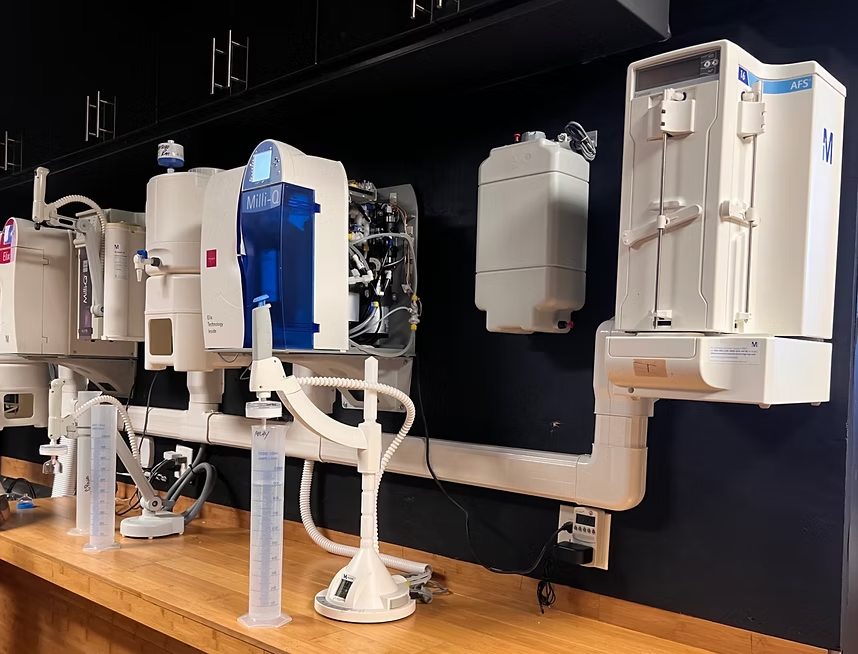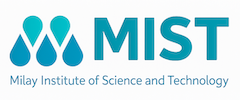Field Service Technician (Water Purification System)

- The Field Service Technician Certificate (Water Purification System Specialty) prepares students to install, maintain, and troubleshoot high-purity water purification systems commonly used in laboratory, pharmaceutical, clinical, and industrial settings.
Students will gain hands-on experience with components such as reverse osmosis (RO), deionization (DI), ultraviolet (UV) disinfection systems, and multi-stage filtration assemblies. The course also covers sensor calibration, water quality testing, and preventive maintenance, ensuring students are ready to enter the field with job-ready skills.
This program is ideal for individuals seeking entry-level positions as water purification technicians, laboratory equipment support specialists, or cleanroom maintenance technicians. Training is delivered in a blended format with online theory, in-person lab work, and optional externship opportunities.
Note: This course provides general technician-level training in water purification systems. It is not affiliated with or certified by specific manufacturers, such as Millipore, Elga, or Sartorius. However, the skills taught align with the needs of employers who use these systems in regulated environments.
Program Details:
Total Clock Hours: 75–90 hours
Program Duration: 5–6 weeks
Delivery Format: Blended (Online + Hands-On Labs)
Credential Awarded: Certificate of Completion
Prerequisites: High school diploma or equivalent
Program Objectives:
By the end of this course, students will be able to:
Describe the principles of high-purity water systems and water chemistry.
Identify and explain the function of RO, DI, UV, and filtration system components.
Perform calibration of sensors such as conductivity, pH, pressure, and flow meters.
Conduct water quality tests using industry-standard tools.
Troubleshoot system alarms, pressure drops, flow inconsistencies, and microbial contamination.
Document service logs, preventative maintenance records, and compliance checklists.
Curriculum Outline Summary:
| Module | Title | Clock Hours | Description |
|---|---|---|---|
| Module 1 | Introduction to Water Chemistry & System Design | 10 hrs | Covers contaminants, purity levels, and system types used in labs, hospitals, and cleanrooms. |
| Module 2 | System Components & Flow Design | 15 hrs | Focuses on RO membranes, DI tanks, carbon filters, UV sterilizers, storage tanks, and pre/post filters. |
| Module 3 | Sensor Calibration & Monitoring Tools | 15 hrs | Hands-on training in calibrating conductivity, pH, pressure, and flow sensors. |
| Module 4 | Maintenance, Troubleshooting & Compliance | 15 hrs | Covers routine servicing, microbial control, system error response, and industry compliance. |
| Module 5 | Lab Practicum & Water Quality Testing | 20–25 hrs | Includes lab-based assembly/disassembly, diagnostic exercises, and water quality testing with TDS meters, resistivity probes, and sampling protocols. |
| Capstone Project | Final Performance & Report | 5–10 hrs | Simulated field service scenario + documentation submission of maintenance logs and water quality results. |
Course Materials:
Textbook: Ultrapure Water for Laboratories (Millipore Technical Manual – provided in class)
Reference: AAMI TIR34:2014 – Water for the Reprocessing of Medical Devices
Student Workbook: Milay Institute’s Water System Maintenance Guidebook
Lab Tools Provided: Water quality test kits, mock RO/DI/UV system panels, calibration instruments
Optional:
Externship Placement (Optional, 40 hrs):
Students may participate in on-site observation or field simulation with one of Milay Institute’s clinical or industry partners. Externship hours are not required for graduation but are highly recommended for job placement support.
Estimated Regional Ranges for Purification System Technicians
| Metro Area | Estimated Hourly Wage | Approx. Annual Salary |
|---|---|---|
| San Francisco / Oakland | $28–$32 | $60,000–$67,000 |
| San Jose / Silicon Valley | $29–$32 | $62,000–$65,000 |
| Sacramento / CA general | $24–$29 | $50,000–$60,000 |
These estimates reflect roles servicing high-purity RO/DI/UV systems in laboratory, healthcare, or biotech facilities—not municipal water treatment operators.
Career Benefits & Why It’s Attractive
Specialized Yet Underserved
Limited competition compared to municipal roles or broader lab technician positions. Employers often prefer candidates with specific skills in purification system troubleshooting, sensor calibration, and component replacement.
Rapid Entry & Earning Potential
No four-year degree needed; most roles require only a high school diploma and technical certificate.
Bay Area wages start above state average and can support a solid middle-class income in 3–6 weeks of training.
Alignment with Growing Industries
Biotech, pharmaceutical research, and cleanroom labs are expanding in the Bay Area—and each relies on high-purity water systems maintained by skilled technicians.
Career Mobility & Certification Potential
Technicians can move into advanced roles like field engineer or validation specialist.
Additional credentials, such as water quality or calibration certifications, can raise pay into the $70K–$80K+ range.
Summary
Job outlook: Stable to modest growth for skilled technicians serving lab-grade RO/DI/UV water systems, especially as municipal operator roles decline nationally.
Bay Area wage estimate: Approximately $60K–$67K/year, with scope for higher pay in specialized service roles.
Career advantages: Technical specialization, low competition, quick entry, strong regional demand, and career progression.
By training specifically for laboratory-grade systems—rather than municipal utilities—Milay Institute positions graduates to fill a valuable, underserved niche in the Bay Area job marketplace.

